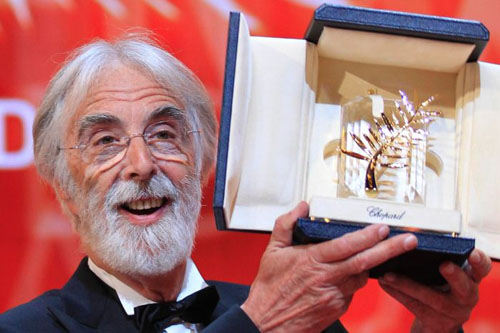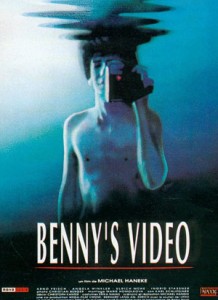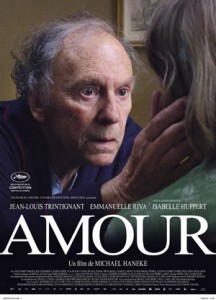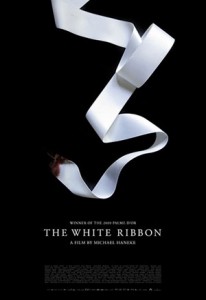The Talents Of An Austrian Auteur
Written by: FFT Webmaster | May 30th, 2012
 With his win this past weekend of a second Palme d’Or in less than 3 years, director Michael Haneke has assuredly climbed into the pantheon of great directors. Not that this prolific auteur has not been hailed for many seasons already, but with the almost unprecedented back to back wins for this year’s AMOUR and 2009’s THE WHITE RIBBON, he has become one of the world leaders in cinema, while still remaining wildly idiosyncratic and, in many fascinating ways, rather unknowable. AMOUR, a passionate and compelling look at the bonds of matrimony that are challenged by age and illness, looks set to be a major international box office hit (not always the case with Cannes Palme d’Or winners) and the current forerunner in end of season awards races, including the coveted Oscar. It is also highly likely that the director himself will see himself in the Oscar race as praise continues to build for what was clearly the event film of the Cannes Film Festival.
With his win this past weekend of a second Palme d’Or in less than 3 years, director Michael Haneke has assuredly climbed into the pantheon of great directors. Not that this prolific auteur has not been hailed for many seasons already, but with the almost unprecedented back to back wins for this year’s AMOUR and 2009’s THE WHITE RIBBON, he has become one of the world leaders in cinema, while still remaining wildly idiosyncratic and, in many fascinating ways, rather unknowable. AMOUR, a passionate and compelling look at the bonds of matrimony that are challenged by age and illness, looks set to be a major international box office hit (not always the case with Cannes Palme d’Or winners) and the current forerunner in end of season awards races, including the coveted Oscar. It is also highly likely that the director himself will see himself in the Oscar race as praise continues to build for what was clearly the event film of the Cannes Film Festival.
While he had his first film successes in Austria, and is closely associated with the current renaissance of Austrian cinema, Haneke is actually German. He was born in Munich, the son of the German actor and director Fritz Haneke and the Austrian actress Beatrix von Degenschild. He attended the University of Vienna to study philosophy, psychology and drama after failing to achieve success in his early attempts in acting and music. After graduating, he became a film critic and from 1967 to 1970 he worked as editor and dramaturge at the southwestern German television station Südwestfunk. He made his debut as a television director in 1974, working on Austrian television series and films made for television.
 Haneke’s feature film debut was 1989’s THE SEVENTH CONTINENT, an intense drama about a seemingly normal family which self-destructs. The film, which was honored at its debuts at the Locarno and Ghent film festivals, served as an early touchstone of the director’s bold often violent style, which would bloom in the grotesque over the next decade. Three years after his debut, he made the still controversial BENNY’S VIDEO, about a boy who watches violent videos and begins to act out his fantasies in equally violent style. The film caused a sensation, dividing audiences and critics, and winning the top prize at the Vienna Film Festival as well as the FIPRESCI International Critics Award at the European Film Awards. In 1997, he made the equally controversial FUNNY GAMES, about two psychotic young men who kidnap and torture a family for nothing other than their perverse pleasure. The film was another hot button entry on the international film festival circuit, and marked the first time that the director had a film in the Cannes Film Festival’s main competition section. In 2007, he had the rare opportunity to direct the Hollywood adaptation of the same film, which starred Tim Roth, Naomi Watts and Michael Pitt, but was a failure at the box office.
Haneke’s feature film debut was 1989’s THE SEVENTH CONTINENT, an intense drama about a seemingly normal family which self-destructs. The film, which was honored at its debuts at the Locarno and Ghent film festivals, served as an early touchstone of the director’s bold often violent style, which would bloom in the grotesque over the next decade. Three years after his debut, he made the still controversial BENNY’S VIDEO, about a boy who watches violent videos and begins to act out his fantasies in equally violent style. The film caused a sensation, dividing audiences and critics, and winning the top prize at the Vienna Film Festival as well as the FIPRESCI International Critics Award at the European Film Awards. In 1997, he made the equally controversial FUNNY GAMES, about two psychotic young men who kidnap and torture a family for nothing other than their perverse pleasure. The film was another hot button entry on the international film festival circuit, and marked the first time that the director had a film in the Cannes Film Festival’s main competition section. In 2007, he had the rare opportunity to direct the Hollywood adaptation of the same film, which starred Tim Roth, Naomi Watts and Michael Pitt, but was a failure at the box office.
 In 2001, his greatest success came with THE PIANO TEACHER, his first film in French, which won the prestigious Grand Prize at the Cannes Film Festival, where it also won Best Actor and Actress awards for its two leads Benoît Magimel and Isabelle Huppert. In the film, Huppert plays a disturbed yet fragile piano teacher who becomes obsessed with her male student. The film was a major international hit for the director, and began his decade long collaboration with French producers and making films in the French language. Aside from Huppert, who also stars in this year’s AMOUR, the director has collaborated closely with French actress Juliette Binoche, directing her in the highly regarded CODE UNKNOWN in 2000 and CACHE in 2005.
In 2001, his greatest success came with THE PIANO TEACHER, his first film in French, which won the prestigious Grand Prize at the Cannes Film Festival, where it also won Best Actor and Actress awards for its two leads Benoît Magimel and Isabelle Huppert. In the film, Huppert plays a disturbed yet fragile piano teacher who becomes obsessed with her male student. The film was a major international hit for the director, and began his decade long collaboration with French producers and making films in the French language. Aside from Huppert, who also stars in this year’s AMOUR, the director has collaborated closely with French actress Juliette Binoche, directing her in the highly regarded CODE UNKNOWN in 2000 and CACHE in 2005.
 His film THE WHITE RIBBON, which premiered at the 2009 Cannes Film Festival, was another milestone. Set in 1913 and dealing with strange incidents in a small town in Northern Germany that foreshadow the authoritarian, fascist-like atmosphere that would unfold when the Nazis took power a decade later. The film became another international sensation, winning the Palme d’Or at the Cannes Film Festival and being nominated for Oscars as Best Foreign Language Film and for its lush cinematography. With his second win of the Palme d’Or this year, Haneke joins a rarified group of filmmakers who have won the prestigious prize twice, including such cinema giants as Francis Ford Coppola, Shōhei Imamura, the Dardenne brothers, Alf Sjöberg, Bille August and Emir Kusturica.
His film THE WHITE RIBBON, which premiered at the 2009 Cannes Film Festival, was another milestone. Set in 1913 and dealing with strange incidents in a small town in Northern Germany that foreshadow the authoritarian, fascist-like atmosphere that would unfold when the Nazis took power a decade later. The film became another international sensation, winning the Palme d’Or at the Cannes Film Festival and being nominated for Oscars as Best Foreign Language Film and for its lush cinematography. With his second win of the Palme d’Or this year, Haneke joins a rarified group of filmmakers who have won the prestigious prize twice, including such cinema giants as Francis Ford Coppola, Shōhei Imamura, the Dardenne brothers, Alf Sjöberg, Bille August and Emir Kusturica.
Haneke, who also works in live theater and opera in Austria and Germany, believes that films “should offer viewers more space for imagination and self-reflection”. His films have been marked as “difficult” only because he resists the temptation to spell everything out for the audience, instead of engaging them to use their own logic and imagination to fill in parts of the narrative. He has been openly contemptuous of Hollywood filmmaking style, which he sees as offering mindless consumption without a need to think and analyze. He has applied philosophical principles which have influenced his own life to his films, being one of the few working filmmakers who see film as a higher art form capable of touching the infinite. “My films are intended as polemical statements against the American ‘barrel down’ cinema and its dis-empowerment of the spectator” he was recently quoted as saying. “They are an appeal for a cinema of insistent questions instead of false (because too quick) answers, for clarifying distance in place of violating closeness, for provocation and dialogue instead of consumption and consensus.” His world view will be on full high as AMOUR begins its career in Europe this summer and eventually in North America via Sony Pictures Classics at year’s end. Expect to hear a lot about the film and Herr Haneke in the months to come.

